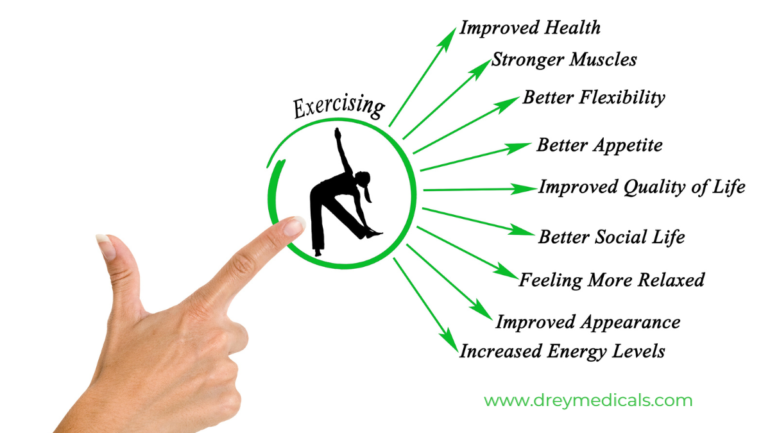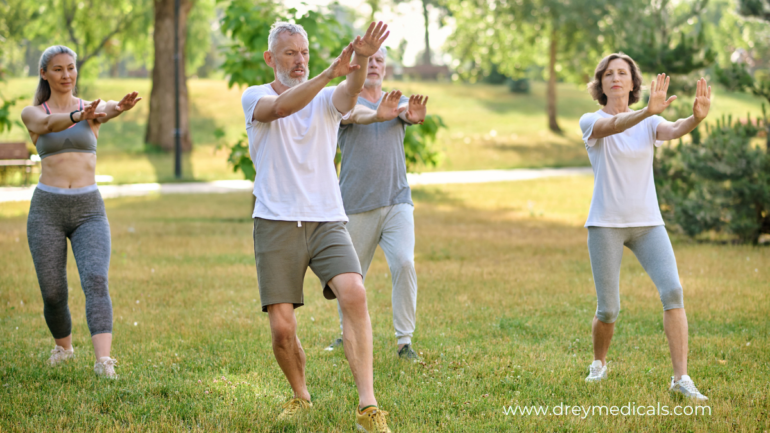Introduction: Understanding the Benefits of Exercise
The benefits of exercise extend across all aspects of health, offering a foundation for both physical and mental well-being. Exercise is more than just a way to lose weight or build muscle it positively impacts longevity, improves health, and increases overall fitness. In an era where many people lead sedentary lives, the benefits of exercise have become essential knowledge for achieving a balanced lifestyle. Studies show that regular exercise not only reduces the risk of chronic diseases, such as cardiovascular issues and diabetes but also helps in achieving strength and endurance.
In this comprehensive guide, we’ll explore the benefits of exercise in detail, from physical and mental health improvements to its role in building strength and improving health. By understanding these benefits, you can start a fitness journey tailored to both your goals and lifestyle. Whether it’s enhanced physical fitness or mental resilience, the of exercises are truly transformative. Read on to discover how a consistent exercise routine can change your life.

Physical Fitness: Why Regular Exercise Matters
Improving fitness is one of the core of exercise. Physical fitness encompasses cardiovascular health, flexibility, muscle strength, and body composition, all of which play a role in your body’s overall functionality. Regular exercise helps in maintaining a balanced fitness level, which ensures that you can complete daily tasks with ease and less fatigue. Without regular movement, physical health deteriorates, leading to lower energy levels, potential weight gain, and susceptibility to illness.
Exercises that increase cardiovascular endurance, such as running or swimming, help the heart and lungs work more efficiently. For muscle strength, resistance training exercises like weightlifting or body-weight routines provide substantial benefits, improving both strength and physical. Moreover, flexibility exercises, such as yoga, support joint health, reducing the risk of injury and increasing agility. Achieving balanced physical fitness through exercise is fundamental not only for aesthetics but also for a healthy, functional body.
Regular exercise for fitness also regulates weight and body composition, which supports overall health. This impact on physical health reduces the risk of conditions like hypertension, diabetes, and obesity, illustrating why exercise is vital. Making a consistent effort to improve fitness yields many rewards, enhancing both energy levels and quality of life over time.
Mental Health Benefits of Exercise
One of the most significant exercises is its impact on mental health. Exercise promotes the release of endorphins—natural chemicals that enhance mood and combat stress. For those struggling with depression or anxiety, regular exercise can be a powerful tool to manage symptoms, as it helps in regulating stress hormones like cortisol. In fact, studies have shown that exercise can be as effective as medication for some people managing mild to moderate depression.
Beyond mood enhancement, the benefits of exercise include cognitive improvements, particularly as we age. Regular exercise has been shown to slow down cognitive decline, improve memory, and enhance focus. These mental health benefits are linked to improved blood flow to the brain, which fosters neurogenesis, and the formation of new brain cells. This process helps combat age-related memory decline and improves learning and problem-solving skills.
Exercise is also closely linked to better sleep, which is essential for mental and physical well-being. Better sleep can reduce stress, improve mood, and contribute to overall mental health. Thus, the benefits of exercise for mental health extend beyond the immediate “mood boost” and offer long-lasting improvements in emotional and psychological resilience. Incorporating exercise into your daily routine is a proactive way to enhance mental health and maintain emotional well-being.

Boosting Muscle Strength Through Exercise
One primary benefit of exercise is the enhancement of muscle. Strong muscles support daily functions and reduce the risk of injuries, making exercise important not just for athletes but for anyone aiming for better mobility and independence. Building through resistance training exercises, like weightlifting or body-weight workouts, provides significant physical benefits and promotes higher metabolic activity, meaning you burn more calories even at rest.
Resistance training helps increase muscle by stimulating muscle fibres to grow and adapt to greater loads, especially through progressive overload. This means gradually increasing weight or resistance to continuously challenge muscles, which is essential for sustained strength gains. Increasing strength has other health benefits too, including improved posture, reduced back pain, and better bone health. As muscles strengthen, they also improve joint support, reducing strain and enhancing flexibility.
With enhanced muscle strength, daily activities become easier, energy levels increase, and the risk of injuries decreases. Building muscle is especially important as we age, as it counteracts natural muscle loss. Including exercises aimed at muscle strength in your routine provides functional benefits that impact all areas of life, supporting both physical and mental well-being over the long term.
Cardiovascular Health and Exercise
Exercise is an essential tool for improving cardiovascular health, making it one of the most critical benefits of exercise. Engaging in cardio activities, such as running, cycling, or swimming, strengthens the heart and improves its efficiency in pumping blood throughout the body. This increased efficiency lowers blood pressure, reduces harmful cholesterol levels, and boosts “good” cholesterol, contributing to a healthy cardiovascular system. Cardiovascular exercise is essential for reducing the risk of heart disease, which remains one of the leading causes of mortality worldwide
The benefits of cardiovascular extend beyond just the heart. Good cardiovascular health improves blood circulation, which benefits the entire body, including the brain. Enhanced circulation can lower the risk of blood clots, reduce the chances of a stroke, and improve mental clarity and focus. Maintaining cardiovascular health also plays a role in weight management, as regular aerobic activities help burn calories and reduce excess body fat a critical factor for heart health.
In addition to enhancing heart function, cardiovascular exercise improves endurance, allowing you to perform daily tasks with greater ease and less fatigue. This boost in endurance translates into better quality of life and longevity. With regular cardio exercise, your cardiovascular health is protected, leading to a longer, healthier life. Incorporating cardio into your exercise routine, even with simple activities like walking or jogging, can provide substantial benefits for heart health and overall wellness.

Supporting Weight Management
One of the most popular benefits of exercise is its role in weight management. By burning calories, exercise helps in reducing body fat and maintaining a healthy weight. This, in turn, reduces the risk of obesity and other related diseases, such as type 2 diabetes, heart disease, and certain cancers. Furthermore, regular physical activity boosts metabolism, helping the body use energy more efficiently, which contributes to long-term weight control. Establishing a consistent exercise routine, combined with healthy eating habits, is essential for achieving and sustaining desired weight outcomes while enhancing overall health and well-being.
Strengthening the Immune System with Exercise
Regular exercise is an essential way to boost the body’s natural defences, strengthening the immune system and making it more effective at fighting off infections and illnesses. Exercise helps the immune system in several ways, primarily by promoting the circulation of immune cells throughout the body. During physical activity, immune cells that patrol the bloodstream, such as T cells and natural killer cells, move more freely and at a faster rate. This improved circulation helps immune cells detect pathogens and damaged cells more quickly, allowing the body to respond to threats more effectively. Over time, regular physical activity strengthens immune cell function, helping the body stay resilient against viruses and bacteria.
Light to moderate exercise has been particularly beneficial for reducing inflammation, which can otherwise hinder immune function. Chronic inflammation, often caused by stress, poor diet, or lack of physical activity, can suppress immune responses and make the body more susceptible to illnesses. Exercise helps by lowering levels of inflammatory markers, like C-reactive protein (CRP), while also increasing the production of anti-inflammatory cytokines. By reducing inflammation, regular physical activity creates a healthier environment in the body where immune cells can operate more efficiently. The effects are cumulative, meaning that consistent exercise over time leads to sustained improvements in immune function, rather than short-lived boosts.
Beyond its impact on cellular immunity, exercise promotes overall bodily functions that support a strong immune system. Physical activity improves cardiovascular health, sleep quality, and stress management, all of which play key roles in immune health. For example, better sleep patterns allow the body to repair itself and produce essential immune cells, while cardiovascular health enhances blood flow, which aids in the distribution of immune cells throughout the body. Additionally, exercise is known to reduce stress hormones, like cortisol, that can otherwise suppress immune responses when elevated. In this way, regular exercise creates a supportive environment that strengthens the body’s natural defences, making it easier to stay healthy year-round.
Enhancing Flexibility and Mobility
Improving flexibility and mobility is essential for overall physical health, especially as we age. Flexibility refers to the ability of muscles to stretch, while mobility is the ability of joints to move through their full range of motion. Regularly incorporating flexibility and mobility exercises into a fitness routine enhances movement efficiency and reduces the risk of injury. Activities like yoga, Pilates, and stretching exercises focus on lengthening muscles and maintaining joint health, which can lead to better posture and less tension throughout the body. These practices are particularly valuable for individuals who sit for prolonged periods, as they counteract the stiffness and discomfort often caused by sedentary lifestyles.
One of the most significant benefits of enhanced flexibility is the prevention of muscle strains and joint injuries. When muscles are flexible, they are less likely to be overstretched or torn during sudden movements or physical activities. Mobility, in turn, ensures that the joints can move freely, which is crucial for maintaining balance, coordination, and functional strength. For instance, hip and ankle mobility are essential for performing everyday tasks, like bending down to lift objects or climbing stairs. By improving both flexibility and mobility, individuals can prevent common issues like back pain, joint stiffness, and muscle cramps, making daily activities more comfortable and reducing long-term physical limitations.
In addition to injury prevention, increased flexibility and mobility contribute to enhanced athletic performance and better quality of life. For athletes and active individuals, having a full range of motion allows for more powerful and controlled movements, whether it’s sprinting, lifting weights, or playing sports. For others, improved flexibility simply makes daily activities—like reaching, bending, and twisting—easier and more enjoyable. Studies show that consistent flexibility training also aids in relaxation, reduces stress, and improves mental clarity by encouraging a deeper connection between body and mind. Embracing flexibility and mobility exercises is, therefore, not only beneficial for physical health but also for mental well-being, supporting a balanced lifestyle and promoting longevity.
Exercise and Longevity
Exercise is one of the most effective ways to extend lifespan and enhance quality of life. Regular physical activity is linked to longer life due to its positive impact on cardiovascular health, metabolic function, and immune strength. Exercise helps maintain a healthy weight, lowers blood pressure, and improves cholesterol, reducing the risk of heart disease and type 2 diabetes. Beyond disease prevention, exercise slows ageing processes by preserving muscle mass and bone density and supporting cellular health through mitochondrial function and autophagy. Studies show that exercise also helps maintain telomere length, promoting resilience and vitality as we age.
Social and Emotional Benefits of Group Exercise
Group exercise offers a range of social and emotional benefits that enhance both physical and mental well-being. Participating in group activities, such as fitness classes, team sports, or outdoor workouts, provides a unique sense of community and connection with others who share similar goals. The social aspect of group exercise can be especially motivating, helping individuals stay committed to their fitness routine by creating a sense of accountability. Being part of a group fosters a supportive environment where people can encourage one another, celebrate achievements, and work through challenges together. This shared experience builds camaraderie and often leads to lasting friendships, making exercise feel like a rewarding social activity rather than a solitary obligation.
In addition to social connection, group exercise promotes emotional well-being by reducing stress, improving mood, and combating feelings of loneliness. Physical activity itself releases endorphins, which are known as “feel-good” hormones that reduce stress and promote a sense of happiness. When exercise is combined with positive social interaction, these mood-enhancing effects are amplified. Many people report feeling a significant boost in self-esteem and confidence when working out with others, as they feel more motivated and empowered by the group’s collective energy. Exercising in a group setting can also reduce symptoms of anxiety and depression, as the communal environment offers a natural support system, where individuals feel understood and encouraged.
Furthermore, group exercise often provides opportunities for personal growth and development, as participants work toward common goals. Many group fitness settings, like yoga classes or cycling clubs, encourage individuals to push beyond their comfort zones, setting and achieving goals that might have seemed unreachable on their own. As individuals reach new milestones, they experience a sense of accomplishment and pride, which enhances emotional resilience and self-worth. This positive reinforcement not only keeps people engaged in their fitness journey but also transfers to other areas of life, fostering a mindset of perseverance, optimism, and resilience. By participating in group exercise, individuals gain both physical benefits and a stronger social support network, leading to a more fulfilling and balanced lifestyle.
Tips for Starting Your Exercise Journey
Starting an exercise journey can be exciting yet challenging, but following a few key tips can ensure long-term success. Set realistic goals—whether improving strength, losing weight, or boosting mental well-being—to provide motivation. Choose enjoyable activities like walking, dancing, or swimming to make exercise fun. Begin with short sessions of 15-20 minutes, gradually increasing duration and intensity as you adapt. Seeking guidance from a fitness professional can help with techniques and personalized routines. Don’t forget to warm up, cool down, and stretch to prevent injuries. Track your progress through apps or journals to stay motivated and celebrate milestones. Most importantly, stay consistent and view exercise as a positive lifestyle change rather than a quick fix.
Conclusion: Embrace the Benefits of Exercise for Life
Embracing the benefits of exercise is a lifelong commitment to health and vitality. Regular physical activity lays the groundwork for improved fitness, mental resilience, and overall quality of life. Exercise strengthens the immune system, supports cardiovascular health, boosts mood, and reduces the risk of chronic diseases. It also enhances mental clarity, emotional stability, and social connections, promoting a balanced lifestyle. Remember, exercise is about building a sustainable routine that prioritizes health and happiness. By making it enjoyable and consistent, you’re investing in a healthier, more fulfilling future—one step, stretch, or lift at a time.



